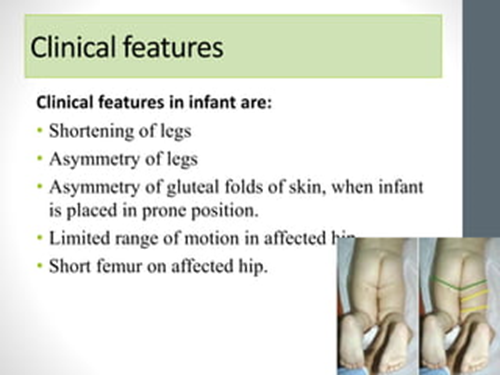A nurse is collecting data from an infant who has developmental dysplasia of the hip (DDH). Which of the following findings should the nurse expect?
Inwardly turned foot on the affected side
Lengthened thigh on the affected side
Absent plantar reflexes
Asymmetric thigh folds
Correct Answer : A,D
A. Inwardly turned foot on the affected side.
This finding is consistent with DDH. In infants with DDH, the affected leg may appear shortened and rotated inwardly due to hip instability or dislocation.
B. Lengthened thigh on the affected side.
This finding is not typically associated with DDH. In fact, the affected thigh may appear shortened rather than lengthened due to abnormal positioning of the hip joint.
C. Absent plantar reflexes.
Absent plantar reflexes are not directly related to DDH. Plantar reflexes assess the function of the spinal nerves in the lower extremities and are not typically affected by hip dysplasia.
D. Asymmetric thigh folds.
This finding is consistent with DDH. Asymmetric thigh folds, where one thigh appears fuller or has more skin folds compared to the other, can be indicative of hip dysplasia. The skin folds may be more prominent on the unaffected side due to the displacement of the femoral head on the affected side.

Nursing Test Bank
Naxlex Comprehensive Predictor Exams
Related Questions
Correct Answer is C
Explanation
A. "I will restrict the amount of salt in my child's meals."
Restricting salt intake is not typically recommended for children with cystic fibrosis (CF). In fact, individuals with CF often have increased salt requirements due to excessive salt loss through sweat. Restricting salt intake could potentially lead to electrolyte imbalances. Therefore, this statement does not demonstrate an understanding of the dietary management necessary for CF.
B. "I will put my child in daycare to ensure that she socializes with other children."
While socialization is important for a child's development, placing a child with CF in daycare may increase their risk of exposure to respiratory infections, which can be particularly dangerous for individuals with CF due to their compromised respiratory function. Therefore, this statement does not demonstrate an understanding of the infection control measures necessary for managing CF.
C. "I will make sure my child washes her hands before eating.”
This statement demonstrates an understanding of infection control measures, which are crucial for individuals with CF to reduce the risk of respiratory infections. Washing hands before eating helps prevent the transmission of bacteria and viruses that can cause respiratory infections. Therefore, this statement indicates an understanding of an important aspect of managing CF.
D. “I will provide low-fat meals for my child."
Providing low-fat meals is not typically recommended for children with CF. CF often leads to malabsorption of fats, so a diet high in calories and fat is typically recommended to ensure adequate nutrition and weight gain. Therefore, this statement does not demonstrate an understanding of the dietary recommendations necessary for managing CF.
Correct Answer is D
Explanation
A. Allow the child to see and touch IV tubing and supplies.
Allowing the child to see and touch the IV tubing and supplies can help familiarize them with the equipment and reduce anxiety. However, there may be a more appropriate action to take first.
B. Explain to the child's parents what role they will have during the procedure.
While it's important to involve the child's parents and inform them of their role during the procedure, the priority should be to prepare the child for the insertion itself.
C. Describe the procedure using visual aids.
Using visual aids can be helpful in explaining the procedure to the child and providing a clear understanding of what will happen. However, there may be a more appropriate action to take first.
D. Ask the child what he knows about the procedure.
This is the correct answer. Asking the child what they already know about the procedure allows the nurse to assess their understanding and address any misconceptions or concerns they may have. It also helps the nurse tailor their explanation to the child's level of understanding and provide information that is relevant and meaningful to them.
Whether you are a student looking to ace your exams or a practicing nurse seeking to enhance your expertise , our nursing education contents will empower you with the confidence and competence to make a difference in the lives of patients and become a respected leader in the healthcare field.
Visit Naxlex, invest in your future and unlock endless possibilities with our unparalleled nursing education contents today
Report Wrong Answer on the Current Question
Do you disagree with the answer? If yes, what is your expected answer? Explain.
Kindly be descriptive with the issue you are facing.
